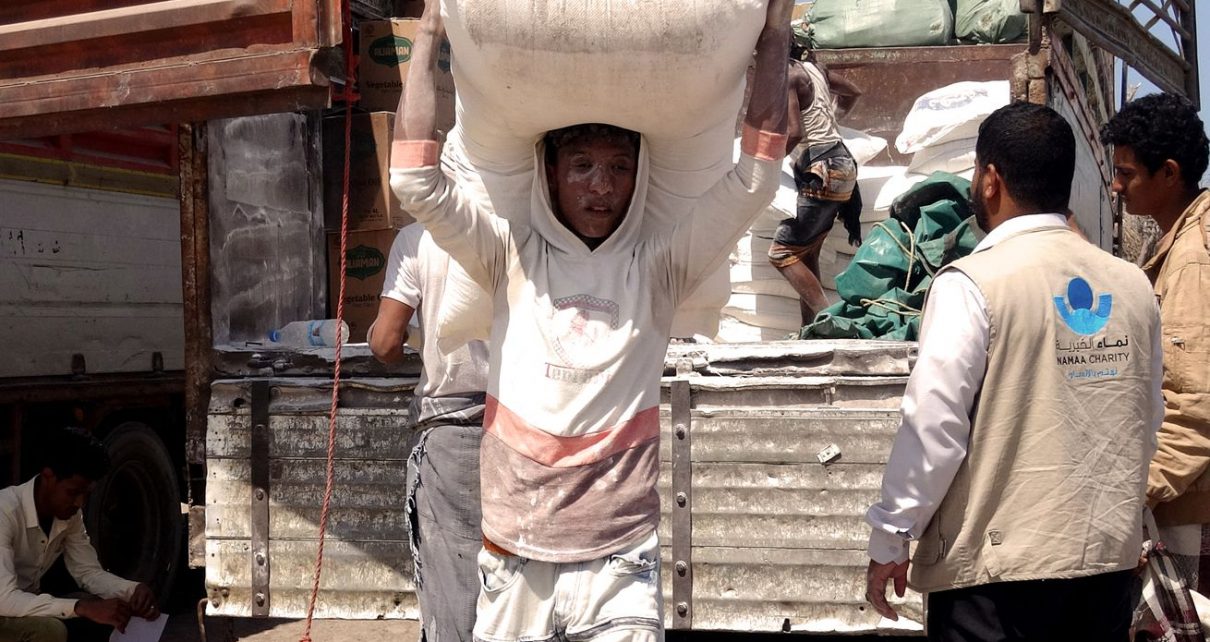
Is there a fuel blockade in Yemen? It’s complicated.
A March CNN report reignited calls, mainly from Democrats and progressive activists, for the US to do more to pressure Saudi Arabia to end what they call its “blockade” of Yemen.
The report said Saudi warships were blockading the Yemeni coast, preventing fuel tankers from docking in the country’s main port of Hodeidah, and that this fuel blockade is directly contributing to the ongoing famine and humanitarian crisis in the country.
Understandably, this led some activists and lawmakers to demand Biden do more to make Saudi lift the blockade and allow in the desperately needed fuel.
There’s just one problem: The Biden administration says there isn’t a blockade — and that any restrictions that are in place aren’t coming directly from the Saudis, but mainly from Yemen’s internationally recognized government. The issue is exacerbated, they say, by the Houthi rebels who control most of the country.
That’s a pretty stark disagreement. And it’s one that has critical implications for the lives of millions of Yemenis who are caught in the middle.
Here’s what we know about what’s actually happening in Yemen, who is responsible for the shortages causing millions of Yemenis to suffer, and whether the Biden administration can or should be doing more to help.
CNN’s blockade report launched a firestorm of controversy
Saudi Arabia, along with several other countries in the region that joined its war effort, has been fighting a war in Yemen since 2015. They’re fighting to oust the Houthis, a rebel group backed by Iran that had just overthrown Yemen’s internationally recognized government led by President Abd Rabbu Mansour Hadi.
The Saudi-led coalition, which until recently was also supported by the US, wants to return Hadi, who currently lives in exile in Saudi Arabia, to power.
When Saudi Arabia and its allies launched the war, they used military force to stop planes from landing and ships from docking in Yemen, saying such measures were necessary to stop the Houthis from smuggling in weapons, including from Iran.
But critics warned the blockade would keep much-needed food, fuel, medicine, and humanitarian aid from reaching desperate Yemenis, including millions of children, who are caught in the middle of the fighting.
That concern proved devastatingly prophetic.
The Integrated Food Security Phase Classification, the world’s top authority on food security, said last year that 47,000 Yemenis were suffering from famine-like conditions and that more than 16 million — over half of Yemen’s population — couldn’t reliably and adequately feed themselves. United Nations agencies have said that at least 400,000 Yemeni children could die this year alone if conditions don’t improve.
/cdn.vox-cdn.com/uploads/chorus_asset/file/22441828/1312182799.jpg) Mohammed Hamoud/Getty Images
Mohammed Hamoud/Getty ImagesWhat CNN found last month fit the years-long pattern: Saudi warships had kept all oil tankers from docking in the Houthi-controlled port of Hodeidah since the start of the year.
“The Saudi vessels that patrol the waters of Hodeidah have control over which commercial ships can dock and unload their cargo,” the outlet reported. “Some goods are getting through — CNN witnessed aid being loaded on to trucks at the port after being delivered by ship — but not any fuel to deliver them.”
This is what has activists so angry. “Food and medicine can’t be transported without fuel,” said Hassan El-Tayyab, the Friends Committee on National Legislation’s lead lobbyist for Middle East policy. “It’s causing a humanitarian nightmare in Yemen right now.”
What’s more, in the midst of the coronavirus pandemic, hospitals are losing power because they don’t have enough fuel to keep the lights on.
In early February, President Joe Biden promised the US would stop supporting the Saudi-led coalition’s offensive operations in the war. But, he added, “We’re going to continue to support and help Saudi Arabia defend its sovereignty and its territorial integrity and its people.”
In light of the CNN report, progressive activists and some Democrats want Biden to go further. Last week, nearly 80 Democrats sent a letter to the president demanding he do more to push Riyadh to end the blockade once and for all.
The problem, though, is that the Biden administration has a totally different read of the situation.
What the Biden administration says: It’s not a blockade, and it’s not really the Saudis
While reporting on the letter Democrats sent to Biden, I asked the State Department for comment, as the agency’s special envoy for Yemen, Tim Lenderking, is leading America’s diplomatic response to the crisis.
It turns out the State Department disagrees with the growing narrative since the CNN report’s release.
“It is not a blockade,” a spokesperson for the agency said Monday. “Food is getting through, commodities are getting through, so it is not a blockade.”
However, the administration does acknowledge there has been a slowdown in the amount of fuel coming into the country, and they’re concerned about it. “The United States understands the urgent need for fuel to get into Hodeidah port,” Lenderking told me on Tuesday. “This is a constant priority in our conversations with the Republic of Yemen government and Saudi Arabia.”
/cdn.vox-cdn.com/uploads/chorus_asset/file/22441836/481531098.jpg) Carolyn Kaster/Getty Images
Carolyn Kaster/Getty ImagesBut the primary culprit for the fuel slowdown, the State Department and the National Security Council contend, is not Saudi Arabia but rather the Hadi government.
Here’s why: Even though it doesn’t actually control the bulk of the country and is operating out of Saudi Arabia, it is still the legitimate, recognized government of Yemen and thus retains authority over who is allowed to dock in Yemen’s ports.
Which means that if the Hadi government doesn’t grant permission to a particular ship to dock in Hodeidah (or elsewhere), that ship can’t dock. The Saudi-led coalition enforces those decisions if necessary with its ships and planes, blocking any vessels Hadi’s government says can’t come in.
And that process of approving ships to dock is where the State Department says the real problem lies, leading to the fuel shortage.
The State Department said it opposes any arbitrary restrictions of commodities entering Yemen, but that “we respect the right of the government to control its access to ports.” However, the spokesperson added, “We do press them and work with them to make sure that their process improves and runs as smoothly as possible.”
In other words, nobody, including the Saudis, is solely for malicious purposes trying to cut off fuel from Yemen. It’s just that the Hadi government’s approval whims are the main issue here.
“It may have faltered, it may not be perfect, it may not be smooth, but it is a Yemeni government process, it is not a Saudi government process,” the State Department spokesperson told me. “We are working with many government officials to try to improve it, to make it as smooth as possible.”
Okay, so who’s right?
It’s important to keep three main questions in mind when trying to figure out who’s right and who’s wrong:
- Is fuel being blocked from reaching Yemen’s most vulnerable?
- If so, who is responsible for blocking it?
- Are they doing it on purpose?
The answer to the first question seems to be yes. Data from the United Nations Verification and Inspection Mechanism for Yemen, the UN body that inspects certain ships coming into the country, clearly shows a significant drop-off of fuel making it into the country over the past two months.
/cdn.vox-cdn.com/uploads/chorus_asset/file/22440634/Screen_Shot_2021_04_13_at_9.38.52_AM.png) OCHA Yemen
OCHA Yemen However, the Biden administration is correct that it’s not exactly a “blockade,” as UN data shows food and fuel are still getting in. The below snapshot from a March 2021 report shows that food imports actually increased from 2019 to 2020.
/cdn.vox-cdn.com/uploads/chorus_asset/file/22440693/Screen_Shot_2021_04_13_at_10.09.52_AM.png) UNVIM
UNVIM And even as fuel went down to zero in February and barely rose in March, food and other cargo were still getting into Yemen, including through Hodeidah.
/cdn.vox-cdn.com/uploads/chorus_asset/file/22441793/Screen_Shot_2021_04_13_at_10.18.16_AM.png) UNVIM
UNVIM As to who is blocking the fuel, both sides are kind of right and kind of wrong.
The Biden administration is correct that any ship carrying fuel must receive approval from the Hadi government to unload at a Yemeni port like Hodeidah. “They have the final say on who gets in,” a spokesperson for the UN office overseeing the crisis in Yemen told me.
But Saudi Arabia’s ships are the ones doing the actual physical blocking. So it is partly their fault, too, as they could choose not to do that.
The Houthis are partly to blame here, too. Experts told me the rebels aren’t great about dispersing the fuel that is allowed to come off the ships. Sometimes they shut down gas stations so that the price of fuel they control on the black market goes up. So they are also responsible for why fuel isn’t getting to those who need it.
As to the third question, is any of this happening on purpose, the answer also seems to be yes. All three parties — the Hadi government, the Saudis, and the Houthis — are guilty of purposely using fuel, and access to it, as a weapon in this war.
In 2018, the warring parties agreed in Stockholm, Sweden, to, among other things, use revenues from imports at Hodeidah to pay civil service salaries in Yemen. In March 2020, though, the Houthis diverted 50 billion Yemeni rials (roughly $200 million) and used the money mostly to fund their fight — a conclusion confirmed by the United Nations in January.
The State Department spokesperson made the same charge: “The Houthis profit from the trade, fuel, and those funds to support their warfront.”
Experts told me in order to stop the Houthis from doing that, the Hadi government — with the Saudi-led coalition’s help — has denied permits to fuel ships in Hodeidah.
In other words, the severe restrictions in fuel imports at Hodeidah aren’t happening out of pure malice, but they are happening on purpose. It’s part of an effort by the Hadi government and the Saudis to stop the Houthis from exploiting fuel revenues for their own benefit. The Hadi government “has declined to let them in [to Hodeidah] because of a long-running dispute with the Houthis over revenue payments,” the UN spokesperson told me.
But that doesn’t mean State is pleased with what’s going on. The spokesperson said that the US is telling the Hadi government it should still allow fuel ships to dock and unload in Hodeidah despite their concerns over the Houthis. “We’ve really been encouraging them to understand the humanitarian imperative,” they told me.
So case closed? Not exactly.
Activists say the Biden administration can and should still be doing more to pressure Saudi Arabia
It’s true that the Hadi government is denying permits for some vessels. It’s also true that the Houthis are siphoning off fuel for their own benefit. But could fuel flow more easily into Yemen if the Saudi-led coalition chose not to block ships from docking and unloading? Of course.
This is a point activists can’t see past. “I don’t buy that is the Yemeni government’s fault. They do not have the navy or aircraft to bomb a ship that threatens to break the blockade,” said Aisha Jumaan, president of the Yemen Relief and Reconstruction Foundation. “This is nonsense, and the State Department knows that.”
“It is hard to fathom that after six years, the US is casting doubt about the existence of the oppressive blockade,” she continued. “It is harder because it is from the Biden administration from whom we expected better judgment.”
/cdn.vox-cdn.com/uploads/chorus_asset/file/22441840/1232201726.jpg) Drew Angerer/Getty Images
Drew Angerer/Getty ImagesIn other words, it’s pretty clear that the Biden administration is downplaying the Saudi role during this entire episode. Secretary of State Antony Blinken on March 1 did “call on all parties to allow the unhindered import and distribution of fuel,” but didn’t specifically call Riyadh out.
That’s surprising for two reasons, experts say. First, the Biden administration has said that human rights are “at the center of US foreign policy.” Minimizing Riyadh’s role in blocking fuel into Yemen isn’t making human rights a priority.
Second, it’s not like the Saudis have downplayed their own role. In March, Saudi Foreign Minister Prince Faisal bin Farhan Al Saud proposed to reopen the airport in Sana’a in exchange for a ceasefire — the first time Riyadh openly acknowledged carrying out any kind of blocking effort in Yemen.
Further, the Saudi-led coalition allowed at least four fuel ships in Hodeidah’s port in March after the Hadi government gave its approval, shortly following pressure from the CNN report. It’s clear, then, that Riyadh plays a key role in deciding which ships do and don’t get to operate in Hodeidah.
This is something UN World Food Program Director David Beasley noted openly last month. “The people of Yemen deserve our help. That blockade must be lifted, as a humanitarian act. Otherwise, millions more will spiral into crisis,” he said in a speech to the UN Security Council. When I asked Beasley’s team what he precisely meant by “blockade,” a spokesperson said that “the fuel shortage is in reference to the coalition blockade.”
Beasley’s remarks follow many other instances of the UN calling the Saudi-led coalition’s efforts a “blockade.”
The question now is why the Biden administration won’t more openly and forcefully deride Riyadh’s involvement in blocking fuel from getting into Yemen.
Analysts say one consideration is that the US is trying to broker a peace agreement between the Saudi-led coalition, the Hadi government, and the Houthis. If the Biden administration berates the Saudis repeatedly, they might lose leverage with a key party in those talks.
Another reason experts noted is that the US is in the middle of negotiations to reenter the Iran nuclear deal, an accord Riyadh doesn’t like. By not speaking out against Saudi Arabia’s complicity in blocking fuel into Yemen, then Riyadh implicitly understands it isn’t to speak out about the Iran diplomacy.
There’s one more: Pushing for Saudi Arabia and its partners to “end the blockade” could lead to the dissolution of the UN ship-inspection system that was put in place to facilitate shipments during a war and humanitarian crisis and curb the smuggling of weapons to the Houthis. If that happens, then it’d be far easier for Iran to send arms to the Houthis and further inflame the war. That also wouldn’t reverse the humanitarian disaster brought on by years of fighting.
Whatever the reason, a bipartisan group of lawmakers is calling on the Biden administration to “urgently push” Riyadh to stop helping keep fuel from reaching Yemeni ports.
“The interference, delay, and outright blocking of commercial goods and humanitarian assistance shipped to Yemen’s ports is a principal cause of price inflation, food insecurity, economic collapse, and the failure of public services in Yemen,” House of Representatives members wrote in a letter to Secretary of State Blinken on Tuesday.
It’s unclear if Biden or his team will listen to them. What is clear, though, is that without Riyadh, a lot more fuel would be flowing into Yemen.





